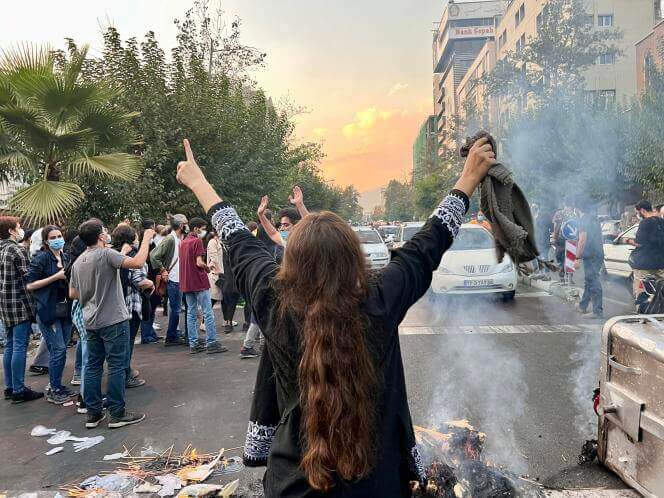In the wake of intensifying nationwide demonstrations in Iran during which security forces have shot dead 31 protesters over the past six days, the United States (US) has sanctioned the Iranian morality police over the death of 22-year-old Mahsa Amini, who died in custody last Friday after she was arrested a day earlier for improperly wearing the hijab.
The Treasury Department on Thursday imposed sanctions “for abuse and violence against Iranian women and the violation of the rights of peaceful Iranian protestors,” noting that the morality police were responsible for Amini’s death.
The regime’s security forces shoot and kill Iranian people on motor cycles nonchalantly. #MahsaAmini#IranProtests pic.twitter.com/RPgBptRqEh
— Masih Alinejad 🏳️ (@AlinejadMasih) September 22, 2022
The Treasury sanctioned the chiefs of the morality police, intelligence ministry, army’s ground forces, Basij paramilitary group, and law enforcement forces. “These officials oversee organisations that routinely employ violence to suppress peaceful protesters and members of Iranian civil society, political dissidents, women’s rights activists, and members of the Iranian Baha’i community,” the statement read.
Treasury Secretary Janet Yellen hailed Amini as a “courageous woman,” whose death was “yet another act of brutality by the Iranian regime’s security forces against its own people.” She said the sanctions demonstrated the Biden administration’s “clear commitment” to defend human rights globally.
Heart aching over this clip.
— Jasmin Ramsey (@JasminRamsey) September 22, 2022
Funeral in Kermanshah, #Iran, for Minoo Majidi (woman), who was reportedly killed amid #IranProtests that started over #MahsaAmini.
Chanting: “Woman, life, freedom!” on Sept 22. (Source: Free Workers Union of Iran) #مهسا_امینی pic.twitter.com/w8JEvVK6mH
Amini, an ethnic Kurd, was arrested last Thursday by members of the so-called ‘Guidance Patrol’ for not wearing her hijab properly. The guidance patrol, also known as the morality police, is a police division in charge of enforcing the Islamic Republic’s laws against immodesty and societal vices. According to reports, Amini was brutally tortured and beaten and passed away while being treated at an intensive care unit of the Kasra hospital in Tehran.
Immediately following her death, protests erupted in her home town of Saqez and later spread to major cities like Tehran, Bandar Abbas, Sanandaj, Orumieh, Kermanshah, Amol, Zahedan, Semnan, Marand, Eslam Shehr, Tabriz, Qom, Mashhad, Arbadil, and Sirjan.
"That all authority in the last analysis rests on opinion is never more forcefully demonstrated than when, suddenly and unexpectedly, a universal refusal to obey initiates what then turns into a revolution."
— Samira Mohyeddin سمیرا (@SMohyeddin) September 22, 2022
- Hannah Arendt, On Revolution#IranProtests #Mahsa_Amini #مهسا_امینی pic.twitter.com/WFKkX0u7lB
According to the Iran Human Rights Organization (IHRO), at least 31 protesters have been killed by Iranian security forces since the demonstrations began. Iran International claims that all 31 protesters were shot dead. Hundreds of protesters have sustained severe injuries, and hundreds of others, including men and women, have been arrested and brutally beaten.
IHRO reported that the city of Amol has witnessed the most violent clashes so far, with over 11 protesters dead. Protesters in Tehran and other cities torched police stations and vehicles. The police claimed that several security officials died in the clashes, including a Basij militia member who was stabbed to death.
America don’t take your freedoms and democracy for granted. Monitor #MahsaAmini #IranRevolution #IranProtests2022 #IranProtests
— Saman Arbabi (@SamanArbabi) September 23, 2022
and know that Iranians are fighting for what we have here.
Support their cause in any shape possible. Reach out to your Iranian friend and hug them. pic.twitter.com/e45TsXoByF
Protesters called for the downfall of the Islamic regime and wished death upon Supreme Leader Ayatollah Khamenei. “Mojtaba, may you die and not become Supreme Leader,” waves of protesters chanted in Tehran, referring to Khamenei’s son, who is believed to be Khamenei’s successor.
Internet and mobile services across the country remain disrupted. Internet watchdog NetBlocks reported earlier this week that the regime has imposed the most severe internet restrictions since the November 2019 protests.
Amazing bravery! In this recent video received from the city of Amol in Northern Iran, Iranians are defying the riot police, which are trying to run away. Iranians are risking their lives to say no to this regime. The West mustn't negotiate with it#IranProtests #MahsaAmini pic.twitter.com/PT1EtGRD0j
— Masih Alinejad 🏳️ (@AlinejadMasih) September 21, 2022
Iranian President Ebrahim Raisi, who is in New York to attend the 77th session of the UN General Assembly, said on Thursday that “acts of chaos” are unacceptable. Raisi reiterated that he has ordered a proper investigation into the cause of Amini’s death. However, the police deny that Amini was mistreated and insist that she died of a heart attack.
Iran’s Intelligence Ministry warned Iranians against joining protests. Calling such acts “illegal,” the ministry said protesters would be prosecuted. “Considering the exploitation of recent incidents by counter-revolutionary movements, any presence and participation in such illegal gatherings […] will result in judicial prosecution,” it said. Officials and state media have blamed Kurdish militants for organising the protests and trying to undermine the government.
While President Raisi held up Qasem Soleimani’s photo in adulation at #UNGA in New York, the Iranian people tore his banner down in Iran.
— Nazanin Boniadi (@NazaninBoniadi) September 22, 2022
Raisi and the Islamic Republic do not represent the Iranian people. #IranProtests https://t.co/cDfsVcjkvM
The Islamic Revolutionary Guard Corps (IRGC) also warned protesters against further incitement. Breaking its silence on the demonstrations, the IRGC praised the “vigilant and tactful” police forces for protecting the Islamic Republic. The Guards called the protests a foreign “conspiracy” aimed at undermining the values of the Islamic Revolution.
It said this is “a vicious attempt of the enemy to target the pure feelings of today’s passionate young people and abuse them by using psychological and media warfare.” While the IRGC “expressed sympathy” with Amini’s family, it claimed that accusations of her mistreatment are based on lies and rumours. It rejected the torrent of international criticism against the Iranian government’s handling of the protests and called them double standards, as many of the countries criticising Iran are responsible for violating human rights.

